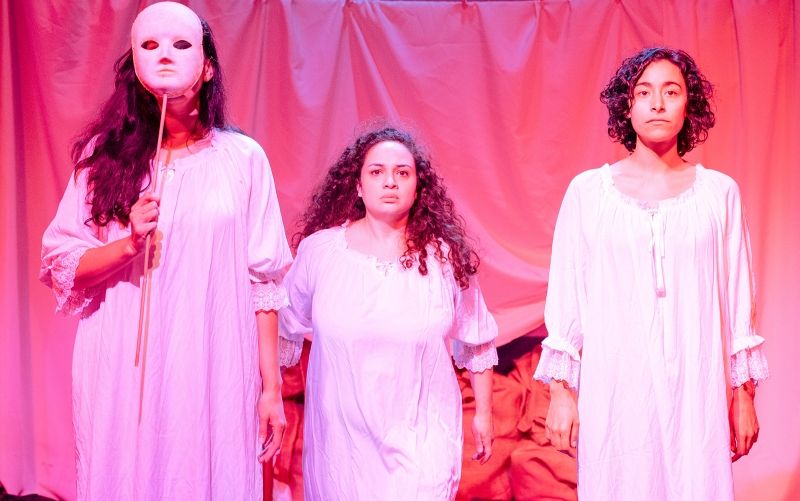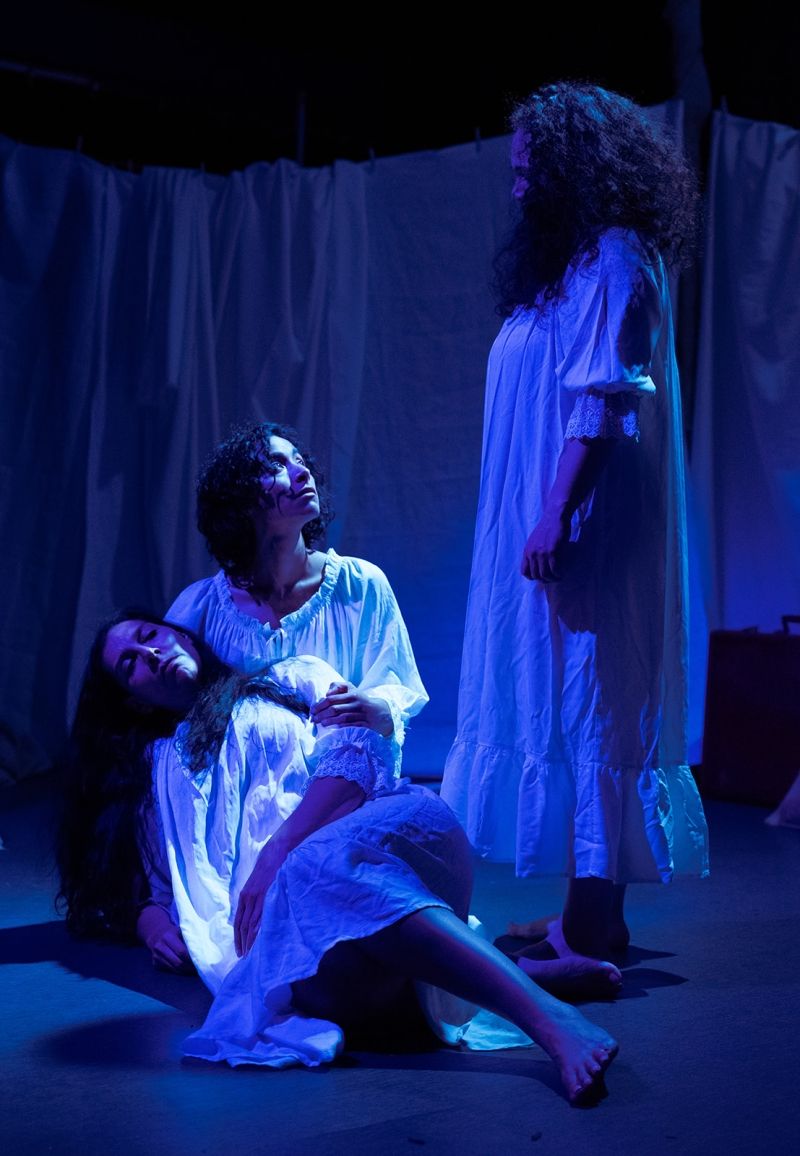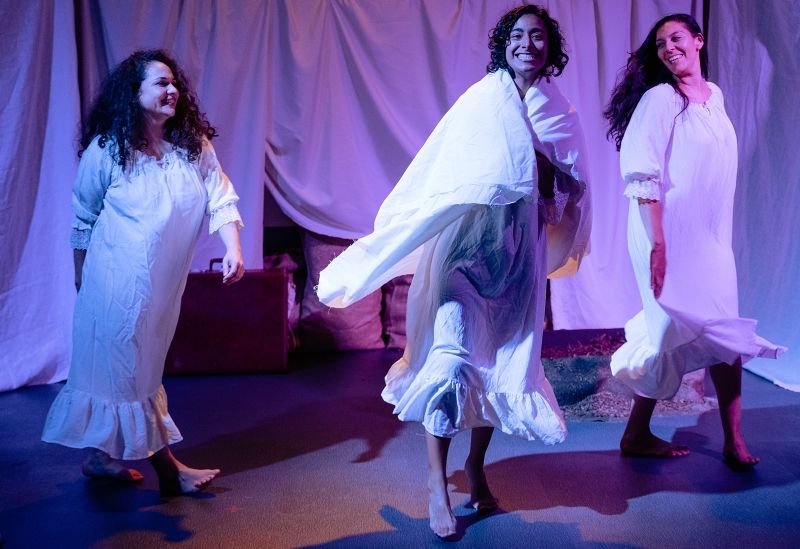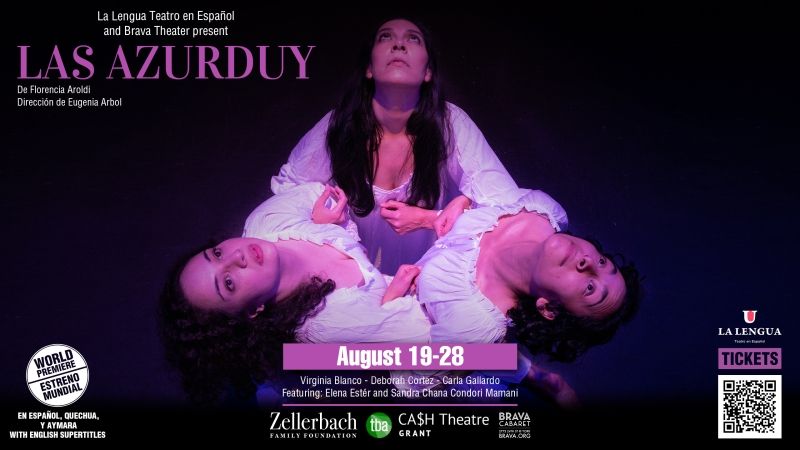Interview: Florencia Aroldi & Virginia Blanco from LAS AZURDUY at Brava's Cabaret, San Francisco
Show dates run from August 19th until de 28th at 7pm (PDT)
Las Azurduy is an original play, commissioned by La Lengua Teatro en Español. This story is a journey into the mind of a female warrior, Juana Azurduy, minutes before her death and during her last battle against oblivion. To get to know more about this interesting character and captivating story, I got together with two of the creators of this play, with the Argentinian playwright , Florencia Aroldi and with the founding artistic director, Virginia Blanco. Their ideas and commitment to the story will lead you to not want to miss their work.

Deborah Cortez, Virginia Blanco,
and Carla Gallardo-Photo by Michelle Castillo-
1. How would you explain to the American audience, who Juana Azurduy was?
FLORENCIA AROLDI (Playwright): Juana Azurduy was an unruly woman, who turned her passion and her voice into concrete actions. She had no limits, and at the same time she was partly responsible for limiting, geographically, her territory, not allowing it to be a colony but a sovereign and empowered homeland. To me, Juana Azurduy is a synonym for courage and liberty, and these qualities and her universal voice, I believe reach all the women in the world, it doesn't matter which nationality we have. I like to compare her spirit with a tree full of strong roots, roots that belong to a territory but actually the branches of that tree grow reaching an infinite sky where all of us women can identify and reflect on her and each other.
VIRGINIA BLANCO (Founding artistic director): She was a Founding Mother, one of the most important women in the process of independence in South America. Both Bolivia and Argentina and other countries in the Latin American region should include her in their pantheon of liberators. Her work was on the same level as any other Male pro-independence hero, with the added value that she lost almost her entire family in the process and also had to fight a symbolic fight against social prejudices about what it means to be not only a woman but also a Mestizo woman. And despite all these merits, she died in poverty, without the corresponding honors, and with not even a portrait that allows us to know what her face looked like.

2.What did you know about Juana before being part of this play? What did you learn from her?
F.A: Before doing Las Azurduy, I barely knew about Juana. I don't think this is just a coincidence, but the systematic silence of patriarchy that tells the story from a male perspective. They made us believe that the country's history has a male voice and white skin. Men took over the syntax, and the grammar of history, but we, the women, we are raising our voices more and more, and in my case, I am regaining the written word, to tell the story from a gender perspective.
V.B: I almost didn't know her. I knew there was a folk song about her and that there was a street in Buenos Aires named after her. At school I remember studying the Ayohuma battle (where she and her troops played a key role) but the history books barely mentioned it. I didn't have any curiosity about her identity until her statue was put up instead of one of Cristopher Columbus. Seeing the mixed reactions that the news generated in the Argentine people got me thinking about sexism, colonialism, and racism, unfortunately all three things, still very tangible in my country. I learnt a lot about everything she had sacrificed to fight against injustices, the effort she put into preparing herself physically and mentally to go to war, and how she was so determined to fight until the end, even when her enemy was much more powerful and prepared than her.

3. Why would you say that Las Azurduy is relevant in today's world?
F.A: Las Azurduy is relevant in this moment because it tells a part of history where women were the main characters of the military life and were as responsible for the consolidation of the independence as men. All of these women, whose names have been erased by this patriarchal history, are represented by Juana Azurduy. I hope that this story starts redirecting the history course not only of the past, but of the present, for reaching the actual liberation of women.
V.B: In times where the #metoo movement is so strong, and where ´feminism' is being revised not only by science, but also by history and art, to determine the real role of women in the world, Las Azurduy is inspired by Juana's story from a very 21st Century view. Juana Azurduy, as a methaphor for the feminist community, she claims her place in history and asks for recognition of her power and rights. There still needs to be a real report against the ancient practice of erasing female protagonism from history. The normalization of women only occupying a secondary role has to end. Since we were little girls, in Argentina, we have been taught that the biggest role that a woman could aspire to in her life to appear in a history book, was to sew flags, like the Patrician Ladies, or to organize gatherings for illustrious men, like Mariquita Sánchez de Thompson.
4.How important it is for this play to be written, performed and directed by only women?
V.B: Enough with stories about women, told or directed by men. When feminism is what's central about a story, it is a contradiction for somebody identified as a man, to tell it. The reason is because a man, no matter how deconstructed he may be and even if he has the best intentions, can never escape his worldview as a man and will always tell the story from those lenses and with that sensitivity.
And with the fact that 90% of the artistic, creative and production team of Las Azurduy is formed by, not only women, but by Latin women, we are just taking the narrative that corresponds to us by law to the next level by doubling the bet. It is our declaration 'Here we are, this is our voice, our work, and our history'.
5. What do you expect the audience to take home from this story?
F.A: I would like them to experience at least a tiny bit of everything that I have experienced while studying Juana and writing about her. For me, this felt like I took a journey together with her, from her childhood until her death. In this journey I also went back to my own childhood, adolescence, and to my present, where I could look and understand myself much better and from a more loving perspective. I hope that the audience can understand the violence that the patriarchy caused to women in the past, and in the present. I hope that this story will inspire women to go out and fight with love, all the necessary battles to reach their dreams.
Las Azurduy was a battle for me, and while writing it I could heal part of my history and that was only possible because now I have a new gender perspective that puts myself inside history, not as an isolated individual, but as part of a bigger community, together with my sisters.
V.B: Juana didn't allow anybody or anything to stop her from achieving what she thought was fair. We could agree or not about her actions and ideas, but in the end, she was only a human being just like us. Las Azurduy doesn't try to show her as a goddess, but it does try to show the inequalities of gender, of racial/ethnic origin, and therefore of hegemony. We don't know a lot about Juana Azurduy, not only because she was a woman, but also becase she was born in South America, as a daughter of a Chola. How come the world knows about Juana de Arco but not about Juana Azurduy, when, even with their differences, they both achieved similar things? History wasn't just ´written by men' as the play says; it was written by white and European men. That is the reason why we included in the story characters that can speak the native languages that Juana used to speak (Quechua voice and Aymara voice), to give them the place they had and deserve in history and to contribute to the normalization of the use of non-colonizing languages in the arts. After all, Spanish is as colonizing as English.

The world Premiere of the show will be presented at Brava's Cabaret in San Francisco, CA. Show dates run from August 19th until the 28th at 7pm (PDT).
To purchase tickets for this play Click Here!

Videos

